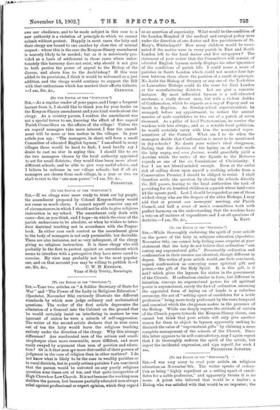[TO THE EDITOR OP THE "SPECTATOR. " ] SIR, — Your two articles on
" A Soldier Secretary of State for War" and "The Power of the Laity in Religious Education" (Spectator, November 8th) curiously illustrate the different standards by which men judge ordinary and ecclesiastical questions. The writer of the first article deprecates the admission of a General into the Cabinet on the ground that he would certainly insist on interfering in matters he was ignorant of unless he were a miracle of self-suppression. The writer of the second article declares that in nine cases out of ten the laity would leave the religious teaching entirely under the direction of the clergy. Why this strange difference? Are uneducated men of the artisan and small- shopkeeper. class more reasonable, more diffident, and more easily swayed by argument than men of position and educa- tion ? Or is it that men ar more distrustful of their powers of judgment in the case of religion than in other matters? I do not know what is likely to be the case in wealthy parishes or in rural districts, but in purely artisan parishes I am convinced that the parson would be outvoted on any purely religious question nine times out of ten, and that quite irrespective of High Church or Low Church. It is not because the working man dislikes the parson, but because partially educated men always rebel against professional or expert opinion, which they regard as an assertion of superiority. What would be the condition of the London Hospital if the medical and surgical policy were under the direction of one doctor and five parishioners of St. Mary's, Whitechapel ? How many children would be vacci- nated if the matter were in every parish in East and South London left to the local doctor and five ratepayers ? The statement of your writer that the Committees will consist of educated English laymen merely displays his utter ignorance of the conditions of parish life. I could name a score of parishes in South London which could not muster four lay- men between them above the position of a small shopkeeper. No doubt the Bishop of Stepney or any one of the Yorkshire or Lancashire Bishops could do the same for East London or the manufacturing districts. Let me give a concrete instance. My most influential layman is a self-educated mechanic, a really devout man, but with a violent dislike of Confirmation, which he regards as a rag of Popery and an insult to Baptism. As Sunday-school superintendent, he managed, before my appointment, to reduce the annual number of male candidates to two out of a parish of seven thousand. As a pillar of local Protestantism, he carries the wardens with him always ; and as a notable local politician, be would certainly carry with hint the nominated repre- sentatives of the Council. What am I to do when the managers decide that Confirmation is never to be mentioned in day-schools ? No doubt your writer's ideal clergyman, finding that the doctrine of the laying on of hands made the laity angry, and even furious, would gracefully yield a doctrine which the writer of the Epistle to the Hebrews regards as one of the six foundations of Christianity. I fear I am not liberal-minded enough. Even at the awful risk of calling down upon myself a scathing rebuke from a Conservative Premier, I should be obliged to resist. I shall therefore settle the question by closing the schools directly the Bill passes, leaving to the local authorities the task of providing for six hundred children in a parish where land costs £4 the square yard. Lest I should be regarded as one of those wicked clergy who are the despair of the abler Bishops, I may add that at present our managers' meeting, our Parish Council, and half a score of men's committees work with perfect harmony on the understanding that the wardens have a veto on all matters of expenditure and I on all questions of






















































 Previous page
Previous page